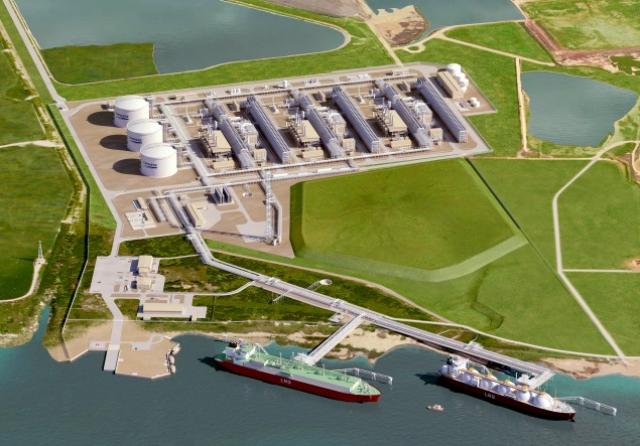
Concept art shows the layout of Cheniere Energy Inc.’s liquefaction facility in Corpus Christi, Texas. Source: Cheniere Energy Inc.
Although natural gas prices took a beating in the post-Labor Day market—dropping 4.31% to $3.89 per million Btu—recent lower prices in the space could present a real opportunity for the industry, analysts say.
In an interview with Midstream Business, Charles Dewhurst, the natural resources practice lead at BDO USA LLP in Houston, said that persistently low natural gas prices highlight the potential for lucrative deals on the LNG export side.
“I think the low prices that we enjoy create an opportunity because of the pricing differential when you look at the market. That’s not to say we should increase our prices in the U.S., but clearly when we’re exporting our LNG to Europe or to Asia, we would be taking advantage of the prevailing prices in those markets, which are significantly higher. That would be a direct benefit for the industry,” he said. “There is a cost, of course, in the liquefaction process and the transportation, but the low prices here would still be plenty sufficient to have a nice margin for exportation.”
In a daily energy and utility note in early September, analysts at Wells Fargo explained that natural gas’s post-Labor Day pricing represented its largest drop since 2008. Between 2009 and 2013, the price after Labor Day moved down between 2% and 3% with an average decline close to 1.3%.
“We continue to remind investors that sentiment swings to extremes, and there is seasonality in natural gas prices,” the analysts said, adding that there is some room for optimism. “We highlight seasonal activity and observed that over the past 20 years, the October contract has finished higher than the September contract 16 of 20 years with average uptick of 12.5%. This could lead to short-term opportunities within gas-levered names.”
Dewhurst said the low prices mean that domestic consumers enjoy lower-cost heating than their counterparts throughout the world during the coldest months.
Recommended Reading
Baker Hughes Awarded Saudi Pipeline Technology Contract
2024-04-23 - Baker Hughes will supply centrifugal compressors for Saudi Arabia’s new pipeline system, which aims to increase gas distribution across the kingdom and reduce carbon emissions
PrairieSky Adds $6.4MM in Mannville Royalty Interests, Reduces Debt
2024-04-23 - PrairieSky Royalty said the acquisition was funded with excess earnings from the CA$83 million (US$60.75 million) generated from operations.
Equitrans Midstream Announces Quarterly Dividends
2024-04-23 - Equitrans' dividends will be paid on May 15 to all applicable ETRN shareholders of record at the close of business on May 7.
SLB’s ChampionX Acquisition Key to Production Recovery Market
2024-04-21 - During a quarterly earnings call, SLB CEO Olivier Le Peuch highlighted the production recovery market as a key part of the company’s growth strategy.
PHX Minerals’ Borrowing Base Reaffirmed
2024-04-19 - PHX Minerals said the company’s credit facility was extended through Sept. 1, 2028.





